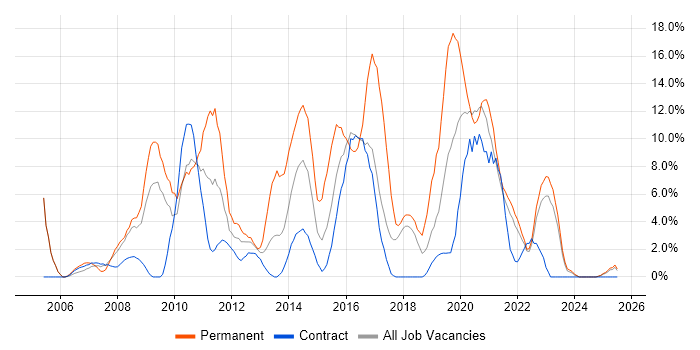Object-Oriented (OO)
Devon > Plymouth
The table below provides summary statistics for permanent job vacancies advertised in Plymouth requiring OO skills. It includes a benchmarking guide to the annual salaries offered in vacancies that cited OO over the 6 months leading up to 25 August 2025, comparing them to the same period in the previous two years.
| 6 months to 25 Aug 2025 |
Same period 2024 | Same period 2023 | |
|---|---|---|---|
| Rank | 20 | - | 32 |
| Rank change year-on-year | - | - | +9 |
| DemandTrendPermanent jobs citing OO | 1 | 0 | 1 |
| As % of all permanent jobs advertised in Plymouth | 0.83% | - | 0.83% |
| As % of the Processes & Methodologies category | 0.91% | - | 0.88% |
| Number of salaries quoted | 0 | 0 | 1 |
| Median annual salary (50th Percentile) | - | - | £55,000 |
| Median % change year-on-year | - | - | -12.00% |
| Devon median annual salary | - | - | £55,000 |
| % change year-on-year | - | - | +12.82% |
All Process and Methodology Skills
Plymouth
OO falls under the Processes and Methodologies category. For comparison with the information above, the following table provides summary statistics for all permanent job vacancies requiring process or methodology skills in Plymouth.
| DemandTrendPermanent vacancies with a requirement for process or methodology skills | 110 | 138 | 114 |
| As % of all permanent jobs advertised in Plymouth | 91.67% | 69.35% | 95.00% |
| Number of salaries quoted | 74 | 94 | 89 |
| 10th Percentile | - | £28,000 | £34,971 |
| 25th Percentile | £25,087 | £37,563 | £42,500 |
| Median annual salary (50th Percentile) | £30,000 | £45,000 | £47,500 |
| Median % change year-on-year | -33.33% | -5.26% | -9.52% |
| 75th Percentile | £54,565 | £55,000 | £57,500 |
| 90th Percentile | £76,254 | £60,068 | £60,950 |
| Devon median annual salary | £32,750 | £45,000 | £45,000 |
| % change year-on-year | -27.22% | - | +1.12% |
OO
Job Vacancy Trend in Plymouth
Job postings citing OO as a proportion of all IT jobs advertised in Plymouth.

OO
Salary Trend in Plymouth
Salary distribution trend for jobs in Plymouth citing OO.

OO
Co-occurring Skills and Capabilities in Plymouth by Category
The follow tables expand on the table above by listing co-occurrences grouped by category. The same employment type, locality and period is covered with up to 20 co-occurrences shown in each of the following categories:
